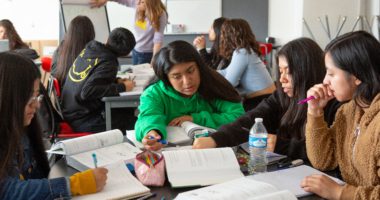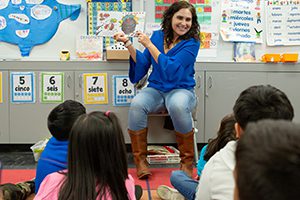Early Literacy or Children’s Right to Read
There is overwhelming evidence that nearly all children can learn to read. And reading proficiently by the end of third grade is one of the most important indicators of future student success: Children who are not yet skillful readers by the end of third grade are four times more likely to drop out of school, and this rate doubles for Black and Latino students and students from low-income backgrounds. Yet these are the very students who often are denied the “right to read.” As such, our nation’s children are currently experiencing a literacy crisis.
Why is this happening? This is largely because today’s classroom instruction does not reflect the scientific consensus about how a child learns to read. And scientifically based reading instruction can be hard —and expensive — to come by: Students from wealthier families can bypass flawed instruction by “outsourcing” reading instruction via private tutoring and additional supports, while those without the means to acquire such resources are left behind.
Most current teachers, sometimes unknowingly, still use ineffective, harmful, teaching methods. To make matters worse, the majority of novice elementary teachers (those who have just one or two years’ experience) are more likely to teach Black and Latino students and students from low-income backgrounds. So, these inexperienced teachers often enter the classroom with training that can reflect a limited or flawed understanding of reading instruction.
When students are exposed to texts with rich, racially and culturally diverse characters, they will become more engaged readers with improved academic outcomes. But despite more than half of students being children of color, students don’t have access to curricula that includes a diversity of cultures, ethnicities, and identities that allow everyone to see themselves represented within the materials.
To provide high-quality literacy instruction to all students, particularly Black and Latino students, students from low-income backgrounds, and students with disabilities, policymakers and education leaders at all levels must adopt policies and practices that ensure all students learn to read and have access to a diverse and culturally responsive set of instructional materials.
EdTrust is committed to bring early literacy to the forefront of education equity issues that our nation’s students are facing to create a sense of urgency. You can read more in the resources provided below. In addition, we have brought together some of the most renowned leaders in the literacy field to form an Early Literacy Advisory Council to help us chart a path forward.
Early Literacy Blog Series
The Literacy Crisis in the U.S. is Deeply Concerning—and Totally Preventable
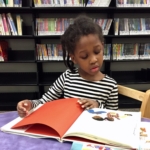 There is currently a literacy crisis happening in the U.S., one that disproportionately affects students of color, and that cannot be ignored. Literacy is one of the major civil rights issues of our time, and our children’s future — and our nation’s democracy — depends on us addressing it now.
There is currently a literacy crisis happening in the U.S., one that disproportionately affects students of color, and that cannot be ignored. Literacy is one of the major civil rights issues of our time, and our children’s future — and our nation’s democracy — depends on us addressing it now.
Rigor and Representation in Children’s Books Foster a Love of Reading
 Alarm bells have been ringing especially loud in recent years about the woeful state of reading in the United States, as reading tests have shown large drops in overall performance and disproportionate impacts from the pandemic on literacy rates, especially for students of color, students with disabilities, English learners, and students from low-income backgrounds.
Alarm bells have been ringing especially loud in recent years about the woeful state of reading in the United States, as reading tests have shown large drops in overall performance and disproportionate impacts from the pandemic on literacy rates, especially for students of color, students with disabilities, English learners, and students from low-income backgrounds.
Teachers Need to Learn How to Teach Reading Effectively
 More than 50 years of research provides a clear picture of effective literacy instruction. These strategies and methods — collectively called scientifically based reading instruction, which is grounded in the science of reading — could dramatically reduce the rate of reading failure.
More than 50 years of research provides a clear picture of effective literacy instruction. These strategies and methods — collectively called scientifically based reading instruction, which is grounded in the science of reading — could dramatically reduce the rate of reading failure.
3 Things You Need to Know About Ongoing Reading Reform Efforts
 Students of color and students from low-income backgrounds are less likely to receive high-quality, scientifically based reading instruction that validates their identity and interests, ultimately denying millions of bright students the core tools needed to become skillful readers.
Students of color and students from low-income backgrounds are less likely to receive high-quality, scientifically based reading instruction that validates their identity and interests, ultimately denying millions of bright students the core tools needed to become skillful readers.
Why We Launched the New York Campaign for Early Literacy
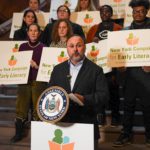 The ability to read is a civil and human right. Reading proficiently by the end of third grade is one of the most important indicators of future student success. It also has significant implications for community outcomes such as employment, poverty, public safety, and health.
The ability to read is a civil and human right. Reading proficiently by the end of third grade is one of the most important indicators of future student success. It also has significant implications for community outcomes such as employment, poverty, public safety, and health.
Profiles in Education Equity: Byron Johns, Co-Founder, Black & Brown Coalition for Educational Equity and Excellence
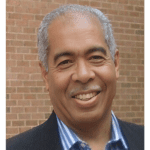 Byron A. Johns is the co-founder of the Black and Brown Coalition for Educational Equity and Excellence (BBC), working with Identity, a Latino advocacy organization, to dismantle systemic barriers that disadvantage Black, Latino children and children from low-income backgrounds.
Byron A. Johns is the co-founder of the Black and Brown Coalition for Educational Equity and Excellence (BBC), working with Identity, a Latino advocacy organization, to dismantle systemic barriers that disadvantage Black, Latino children and children from low-income backgrounds.
EdTrust Resources
- EdTrust-New York Early Literacy Campaign
- A Call to Action: The state of early literacy in New York
- Holding Students Back – An Inequitable and Ineffective Response to Unfinished Learning (EdTrust-MidWest)
- Literacy for All: Let’s Address One of the Most Common Barriers to Reading (EdTrust-MidWest)
- An Examination of The 2021 Learning Loss Remediation and Student Acceleration Act (Tennessee Alliance)
- The Cost of Retention Memo (EdTrust-Tennessee)
- 2023 Tennessee Retention Legislation Tracker (EdTrust-Tennessee)
Webinars
Hear from Tennessee SCORE and district leaders in Tennessee in the LIFT Network, as they shared core insights and advice on building the capacity of teachers and leaders to deliver standards-aligned literacy instruction to improve literacy outcomes.
Early Literacy Advisory Council
Dr. Tequilla Brownie
CEO, The New Teacher Project (TNTP)
 Dr. Tequilla Brownie is chief executive officer of TNTP, a national advocacy and consulting firm focused on disrupting inequities in public education so all students have opportunities to achieve success. Brownie joined to TNTP in 2013 after nearly a decade at Memphis City Schools, where she led districtwide efforts to improve student outcomes by increasing teacher effectiveness, in partnership with the Bill & Melinda Gates Foundation. A graduate of Yale, Brownie holds a master’s degree from the University of Tennessee-Knoxville and a doctorate in education from the University of Memphis.
Dr. Tequilla Brownie is chief executive officer of TNTP, a national advocacy and consulting firm focused on disrupting inequities in public education so all students have opportunities to achieve success. Brownie joined to TNTP in 2013 after nearly a decade at Memphis City Schools, where she led districtwide efforts to improve student outcomes by increasing teacher effectiveness, in partnership with the Bill & Melinda Gates Foundation. A graduate of Yale, Brownie holds a master’s degree from the University of Tennessee-Knoxville and a doctorate in education from the University of Memphis.
Dr. Louisa Moats
Author and Researcher, LETRS
 Dr. Louisa Moats, Ed.D,. is a nationally recognized authority on how children learn to read and why some fail to learn. Widely acclaimed as a researcher, speaker, consultant, and trainer, Moats developed the landmark professional development program LETRS for teachers and reading specialists and the scientifically based LANGUAGE! Live Reading Intervention for grades 5–12. She has been a teacher, psychologist, researcher, graduate school faculty member, and author of many influential scientific journal articles, books, and policy papers on the topics of reading, spelling, language, and teacher preparation, and has served as a board member and officer of the International Dyslexia Association for many years.
Dr. Louisa Moats, Ed.D,. is a nationally recognized authority on how children learn to read and why some fail to learn. Widely acclaimed as a researcher, speaker, consultant, and trainer, Moats developed the landmark professional development program LETRS for teachers and reading specialists and the scientifically based LANGUAGE! Live Reading Intervention for grades 5–12. She has been a teacher, psychologist, researcher, graduate school faculty member, and author of many influential scientific journal articles, books, and policy papers on the topics of reading, spelling, language, and teacher preparation, and has served as a board member and officer of the International Dyslexia Association for many years.
Dr. Maria Murray
CEO and President, The Reading League
 Dr. Maria Murray is the founder, CEO and president of The Reading League. A pioneer in the “science of reading” movement, she has been active in this field for more than 20 years. Before that, Maria was an associate professor at SUNY Oswego, where she taught courses related to literacy assessment and intervention for 10 years. She received her Ph.D. in Reading Education from Syracuse University, where she taught as an adjunct and served as project coordinator for Benita Blachman’s numerous federally funded early reading intervention grants for 12 years.
Dr. Maria Murray is the founder, CEO and president of The Reading League. A pioneer in the “science of reading” movement, she has been active in this field for more than 20 years. Before that, Maria was an associate professor at SUNY Oswego, where she taught courses related to literacy assessment and intervention for 10 years. She received her Ph.D. in Reading Education from Syracuse University, where she taught as an adjunct and served as project coordinator for Benita Blachman’s numerous federally funded early reading intervention grants for 12 years.
Dr. Laurie Olsen
Founder and Strategic Advisor, Sobrato Early Academic Language (SEAL)
 Dr. Laurie Olsen, has spent the last five decades researching, writing, advocating, and providing leadership development and technical assistance on education equity with an emphasis on immigrant, English learner, and bilingual education and has published dozens of books, videos, and articles on the subject. She was the founding director and now strategic advisor to SEAL (Sobrato Early Academic Language), a P-6 model of English learner-centric language and literacy education, currently being replicated in 100 schools across 21 school districts in California. She serves as president of Californians Together, a coalition to protect the rights of English Learners, and is on the Steering Committee of the National Committee on Effective Literacy. Dr. Olsen holds a Ph.D. in Social and Cultural Studies in Education from U.C. Berkeley.
Dr. Laurie Olsen, has spent the last five decades researching, writing, advocating, and providing leadership development and technical assistance on education equity with an emphasis on immigrant, English learner, and bilingual education and has published dozens of books, videos, and articles on the subject. She was the founding director and now strategic advisor to SEAL (Sobrato Early Academic Language), a P-6 model of English learner-centric language and literacy education, currently being replicated in 100 schools across 21 school districts in California. She serves as president of Californians Together, a coalition to protect the rights of English Learners, and is on the Steering Committee of the National Committee on Effective Literacy. Dr. Olsen holds a Ph.D. in Social and Cultural Studies in Education from U.C. Berkeley.
Dr. Tanji Reed Marshall
CEO and Principal Consultant, Liason Educational Partners
 Dr. Tanji Reed Marshall is CEO and principal consultant of Liaison Educational Partners, helping states, districts, schools, and organizations ensure that education and classroom leaders have the mindsets, skills, and tools necessary so underserved students have access to and receive the excellent education they deserve. With more than two decades of experience at the classroom, district, and organization level, Dr. Reed Marshall is a nationally recognized and sought-after expert on education equity and leadership. She was previously the director of P–12 practice at EdTrust and earned her doctorate in curriculum and instruction from Virginia Polytechnic Institute and State University (Virginia Tech).
Dr. Tanji Reed Marshall is CEO and principal consultant of Liaison Educational Partners, helping states, districts, schools, and organizations ensure that education and classroom leaders have the mindsets, skills, and tools necessary so underserved students have access to and receive the excellent education they deserve. With more than two decades of experience at the classroom, district, and organization level, Dr. Reed Marshall is a nationally recognized and sought-after expert on education equity and leadership. She was previously the director of P–12 practice at EdTrust and earned her doctorate in curriculum and instruction from Virginia Polytechnic Institute and State University (Virginia Tech).
Dr. Julie Washington
Professor, University of California Irvine
 Dr. Julie Washington is a professor in the School of Education at the University of California – Irvine (UCI). She is a speech-language pathologist and is a fellow of the American Speech Language Hearing Association. Dr. Washington directs the California Learning Disabilities Research Innovation Hub at UCI and is also director of the Language Variation, Poverty and Academic Success lab. Her research is focused on the intersection of literacy, language variation, and poverty in Black P-5 students.
Dr. Julie Washington is a professor in the School of Education at the University of California – Irvine (UCI). She is a speech-language pathologist and is a fellow of the American Speech Language Hearing Association. Dr. Washington directs the California Learning Disabilities Research Innovation Hub at UCI and is also director of the Language Variation, Poverty and Academic Success lab. Her research is focused on the intersection of literacy, language variation, and poverty in Black P-5 students.
Kareem Weaver
Co-Founder and Executive Director, FULCRUM Oakland
 Kareem Weaver is a co-founder and executive director of FULCRUM, which is committed to improving literacy rates by engaging school districts, universities, government, community organizations, and parent groups to cultivate excellent reading outcomes for all students. Weaver’s advocacy is featured in the documentary film, The Right to Read. He is also the Oakland NAACP’s second vice president and chair of its Education Committee. Weaver previously served as New Leaders’ Executive Director of the Western Region. An award-winning teacher and administrator, Weaver has undergraduate degrees from Morehouse College and a master’s in Clinical-Community Psychology from the University of South Carolina.
Kareem Weaver is a co-founder and executive director of FULCRUM, which is committed to improving literacy rates by engaging school districts, universities, government, community organizations, and parent groups to cultivate excellent reading outcomes for all students. Weaver’s advocacy is featured in the documentary film, The Right to Read. He is also the Oakland NAACP’s second vice president and chair of its Education Committee. Weaver previously served as New Leaders’ Executive Director of the Western Region. An award-winning teacher and administrator, Weaver has undergraduate degrees from Morehouse College and a master’s in Clinical-Community Psychology from the University of South Carolina.

